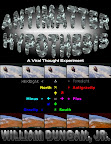| Retrospective « | Perspective Δ | Prospective » |
| Associative N | Objective ↑ | |
| Deductive – | Adaptive/Manipulative ≈ | Inductive + |
| Subjective ↓ | Abductive $ |
| Retrospective « Rule↔Cause→Effect | Perspective Δ Rule↔Cause→Effect | Prospective » Rule↔Cause→Effect |
| Associative N Rule | Objective ↑ Rule↔Cause→Effect | |
| Deductive – Cause | Adaptive/Manipulative ≈ Rule↔Cause→Effect | Inductive + Cause |
| Subjective ↓ Rule↔Cause→Effect | Abductive $ Effect |
| Reasoning | Given | Recall | Infer | Practitioners |
| – deductive | Δ Cause | « Rule | » Effect | mathematicians, scientists |
| $ abductive | Δ Effect | « Cause | » Cause | detectives, diagnosticians |
| + inductive | Δ Cause | « Effect | » Rule | lawyers, artists |
| N associative | Δ Rule | « Cause | » Cause | preachers, politicians |
| ≈ inference | Rule↔Cause→Effect | teachers, negotiators | ||
Deductive Reasoning
For deductive reasoning a given perspective cause lead us to recall a retrospective rule to infer a prospective effect. For example, given the cause of two plus two a mathematician recalls the addition rule with an effect of four. Scientists use a toolkit of known rules to explain cause and effect relationships. For instance, the classification scheme for living organisms is know as a taxonomy. Rules govern the taxonomy. Giving live birth infers a mammal, the cause and effect of deductive reasoning.Abductive Reasoning
For abductive reasoning a given perspective effect lead us to recall a retrospective cause to infer a prospective cause. Given the effect of a victim detectives determine the general cause and then try to find the specific cause: Who done it. Diagnosticians are trained professionals like doctors or computer technicians. Given the effect of symptoms a specific cause is sought based upon known causes that produce similar effects.Inductive Reasoning
For inductive reasoning a given perspective cause lead us to recall a retrospective effect to infer a prospective rule. Lawyers and artists use inductive reasoning, where a deliberate or accidental effect stimulus is produced in an attempt to elicit a sought after response in other people, where causes are keys that unlock access to the universal rule. In rare cases, scientists discover new rules. Isaac Newton took the effects of astronomical observations and discovered the rule of gravitation expressed as a mathematical equation, the same equation used by modern rocket scientists to navigate spacecraft around the solar system, but discovery is more an art than a science.Associative Reasoning
For associative reasoning a given perspective rule lead us to recall a retrospective cause to infer a prospective cause. Preachers and politicians use analogies to link one cause to another cause: parables that describe moral lessons of life, or guilt by association.Inferential Reasoning
The goal of inferential reasoning is to establish common sets of rules, causes, and effects. Teachers and negotiators try to lead the way to common ground through inference to the best possible explanation.To be effective, all the reasoning methods combined must support an unequivocally true conclusion.









No comments:
Post a Comment